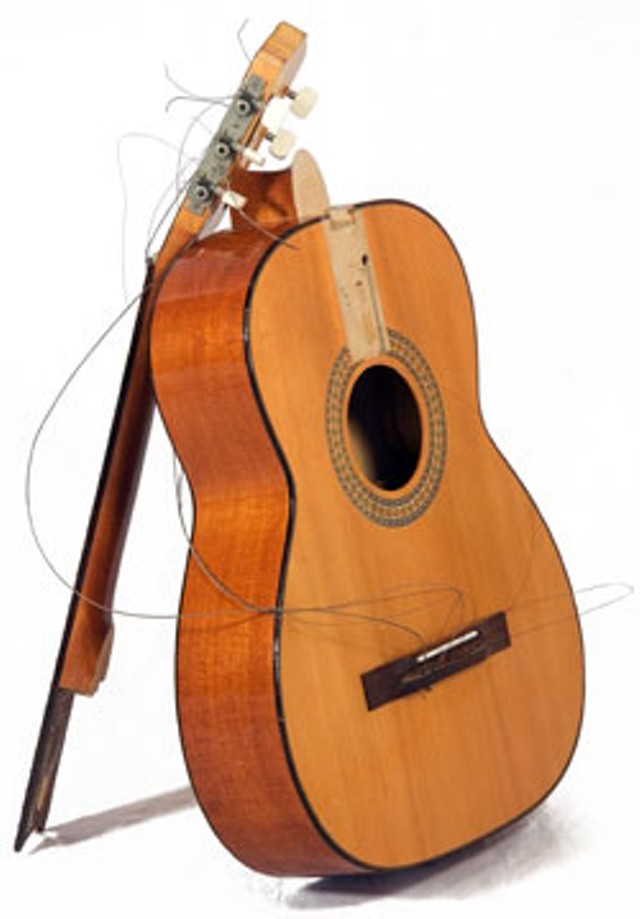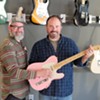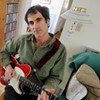Published May 15, 2013 at 7:10 a.m.
Behind every great guitar, fiddle, mando or upright bass player stands a string doctor, a skilled luthier who answers the call when an instrument needs work. Often unheralded, they see it all: a mandolin neck that’s taken a sudden twist, a fiddle top cracked by low humidity, a priceless Martin knocked over by an exuberant toddler, a distraught picker who’s backed the car over his vintage Telecaster. (Yes, it really does happen.) We surveyed some Vermont musicians to see whom they turn to when they need a string doctor with serious skills. Here are the three names that rose to the top.
Pete Langdell
Rigel Instruments, Jeffersonville, rigelinstruments.com
Specialties: Custom-built mandolins, vintage instrument finishes, catastrophic repairs
Notable Customers: Danny Coane, Carrie Cook, Dan Lindner, Bob Amos
At age 5, Pete Langdell wanted a guitar, so he built himself one. The result was a masterwork of Yankee innovation, if not a playable instrument. He built the top and bottom from Formica fiberboard, the sides from aluminum flashing, and the neck from a coffee-table leg.
The tuner knobs proved the most problematic. “I made them from toothpaste caps,” Langdell says with a chuckle. “Fortunately, we had a big family and we used a lot of toothpaste, but it still seemed like a long time to wait.”
Langdell opened his shop, Rigel Instruments, in the late 1980s. His custom mandolins caught on with players ranging from Gene Johnson of Diamond Rio to country legend Marty Stuart. But Langdell’s abilities as a vintage-instrument restoration and repair doc have gained him an equally enthusiastic following. And he understands the importance of his work to the customers he serves.
“When people come to me they can be distraught, heartbroken, really in shock. This might be an instrument they have played for years. It becomes a part of them. And you are trying to make it as good as it was before.”
Doing repair work, Langdell says, is like playing a game of chess. “You really have to think so many moves ahead. What you do in one area will affect another area. In all the steps you are making, you need to be mindful not to create more damage than what already exists.”
One of Langdell’s most sought-after services is custom finish work — matching paint to existing instruments during restoration. He’s even been hired to custom-mix finish colors for major instrument makers, whom he modestly declines to name. He also specializes in fabricating custom metal parts.
Langdell loves the unique nature of musical instruments. “Every instrument is like a fingerprint,” he says. “The wood reacts differently in each one. If instruments became so predictable that you could look at them and say, ‘This is going to sound and play just like this,’ that would take all the fun and mystery out of it.”
Adam Buchwald
Circle Strings, Burlington, circlestrings.com
Specialties: Custom-built guitars, vintage-instrument repairs
Notable Customers: Brett Hughes, Colin McCaffrey, Billy Bratcher, Anders Parker
As a working musician in Brooklyn, Adam Buchwald played alongside Bob Jones, one of New York’s most respected vintage-guitar-repair gurus. Starting in about 2000, Buchwald began hounding Jones to teach him some luthiery. Buchwald got his wish — sort of. “He let me watch him work. But he wouldn’t let me touch anything for a year,” Buchwald says. “It was an incredible learning experience.”
Later, Buchwald began to do repairs under Jones’ guidance. And when a job opened up at Brooklyn’s Retrofret guitar shop, Buchwald jumped at the chance. “My ‘interview’ was them handing me Lefty Frizzell’s Bigsby guitar to see how I handled it,” he says. Buchwald passed. He arrived on his first day at the shop to find a 1920 Gibson mandolin waiting for a refret.
After two years at Retrofret, Buchwald, a former UVM student, returned to Vermont. He did stints at the Vermont Instruments School of Lutherie and Froggy Bottom Guitars. By then, he had already started to build guitars of his own.
Last year, Buchwald moved north, and then opened Circle Strings in Burlington, a 450-square-foot shop just off the UVM campus. “I do about 65 percent repairs and 35 percent building new instruments,” he says. “One feeds the other. People come in for repairs and get to see the instruments I build.”
Buchwald, 35, hasn’t given up performing. He plays mandolin for Bob Amos & Catamount Crossing in St. Johnsbury and banjo for the Modern Grass Quintet in Burlington, and he has just formed the Cider House Boys with Brett Hughes.
Buchwald feels that playing at a high level helps give him a better understanding of the work he does and what his customers want. “It’s not something you can read in a book or watch in a video,” he says. “It’s all just experience. You can do 10 neck sets in 10 Martins, and they are all going to be different. Nothing is ever the same.”
Tucker Barrett
Brattleboro, tuckerbarrett.com
Specialties: Fretwork, vintage repairs, parts fabrication
Vermont Customers: Scott Ainslie, Jatoba, Imaginary Roads Studios, Joey Leone
It’s probably safe to say that there’s no other Vermont luthier who has built a flamingo-shaped, confetti-shooting acrylic guitar for Chic, one of the world’s hottest disco bands. Tucker Barrett’s work building that and other sculptural instruments in the 1980s helped shape his career.
Barrett, 57, started building instruments at Marlboro College in the mid-’70s. Eventually this led to a stint at Manhattan’s Stuyvesant Music from 1980-85.
“It was a total six-day-a-week immersion,” Barrett says. “We built instruments for Andy Summers and Pete Townshend, Nile Rogers of Chic. We did repair work for everybody — the Pretenders, Foreigner, the Police. It wasn’t uncommon for a tour bus to pull in with whoever was playing Madison Square Garden, and somebody jumping out and saying, ‘This has to be fixed.’”
The work for Chic included building electric violins and futuristic sculptural instruments with colored acrylic and lightboxes. Eventually, Barrett took some of those ideas back to Vermont. Over 20 years, he built around 900 violin-family instruments for players all over the world. Eventually, it wore him out.
“I was physically feeling the burn of what I call ‘industrial disease,’” he says. “Too much lacquering, sanding, shaving and sawing was taking its predictable toll on my joints, lungs and brain. And as a sole proprietor, I was tired of wearing all the hats all the time.”
Around 2005, Barrett downsized his shop, moved into Brattleboro to be closer to his customer base, and started doing full-time repair and restoration.
“Philosophically, I really like breathing new life into old things,” Barrett says. “I get a kick out of figuring out how an old instrument was put together and understanding the technique and finishes they used. I get a kick out of taking something that might be nice to look at but doesn’t play at all and making it work again. I seem to have a knack with doing that.”
Barrett isn’t an instrument snob. “I try as well as possible to fix everything that comes into the shop, no matter what it is worth,” he says. “I do a lot of free work for kids or people who can’t afford to get stuff done. I just like to see people playing music. It would be great to be working on ’52 Martins all the time, but it’s not the reality for me. And doing all high-end restoration is work that is very difficult and stressful. It’s kind of fun just making stuff play.”
More By This Author
Speaking of Music
-

Two Local Band Directors March in the Macy's Parade
Nov 22, 2023 -

Before a Burlington Show, the Wood Brothers Get Back to Basics
Oct 26, 2023 -

After a Half-Century of Leading Local Ensembles, Steven and Kathy Light Prepare a Musical Farewell
May 3, 2023 -

Double E 2023 Summer Concert Series Kicks Off With the Wailers
Mar 17, 2023 -

UVM’s New School of the Arts Gathers Many Creative Disciplines Under One Roof
Sep 14, 2022 - More »
Comments
Comments are closed.
From 2014-2020, Seven Days allowed readers to comment on all stories posted on our website. While we've appreciated the suggestions and insights, right now Seven Days is prioritizing our core mission — producing high-quality, responsible local journalism — over moderating online debates between readers.
To criticize, correct or praise our reporting, please send us a letter to the editor or send us a tip. We’ll check it out and report the results.
Online comments may return when we have better tech tools for managing them. Thanks for reading.
















































